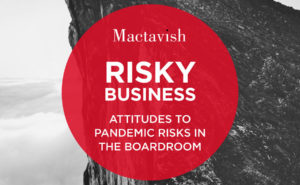
At the end of last year I joined Mactavish – and it has been an eye-opening experience. Most of my career has been spent as either a Partner at KPMG, working on over fifty M&A transactions – the majority being private equity – or as a CFO at rapidly growing companies. I can assure you that, throughout all those years, I did not spend more time thinking about insurance than I absolutely had to!
Like most CFOs who have never experienced a major loss event, I am afraid to say that I tended to take the view that insurance was a fairly commoditised purchase and that as long as you employed a reputable broker and bought policies from the big insurers, you could be confident that you had the right coverage in place. Despite placing a great deal of emphasis on risk and downside management, I tended to take the view that a risk transferred was a risk transferred.
Well, I couldn’t have been more wrong. One of the first research pieces the Mactavish team asked me to read when I arrived was a document on claims analysis. The data showed that 45% of large claims are disputed by insurers, they take an average of three years to settle and the typical payout is only 60% of the initial claim value. A risk transferred is, as often as not, a pending dispute.
This was only the tip of the iceberg. Earlier this year we published a high-profile report that showed that some brokers in the UK market derive up to 80% of their revenue from insurers and only 20% from the policyholders who appoint them to work on their behalf. Worse, that insurer income is often premium-linked, meaning that the more expensive a given policy is, the more the broker stands to profit. The potential for conflicts of interest is not in line with my training or ethical values.
But these are the structural factors behind the way the industry works, the things that really surprised me were the case details that the team shared. Over recent months we’ve been appointed by a large number of SMEs as well as PE firms to work with their portfolio companies to give an independent assessment of their risk transfer programmes – in some cases prompted by extreme operational disruptions arising from Covid-19. To date, we’ve completed over thirty of these ‘Health Check’ reviews and every single one has found errors, omissions and negligence such that the assumed risk is not covered. Here are five examples that stick in the memory:
· One SME company’s broker (a top-tier firm) had simply ‘forgotten’ to place a Directors and Officers policy as instructed – leaving the company’s leadership without any cover whatsoever
· Another firm had bought an expensive Professional Indemnity policy only to find – when the policy was eventually forwarded on from the broker – that it explicitly excluded the core and indeed, sole activity, the company was engaged in
· In one instance, at renewal, a broker had removed all Business Interruption cover from its commercial combined policy (placed as part of the broker’s overall ‘scheme’) without mentioning this to the policyholder on renewal – leaving them unable to claim
· A large number companies had been told that they had no coverage for Covid-19 related losses, only for us to find that this wasn’t the case and notifications could have been made in light of a much more nuanced picture of coverage here which is now emerging.
These are just some of the standout instances. There are many more. In each case, had the companies in question suffered a major loss, they would have been left without recourse to insurance – and that’s before the insurer uses a technicality to dispute the claim! The end result would have been that those firms would have either had to redirect capital and reduce their growth trajectory or required additional funding in order to survive.
One of the things that struck me when I joined Mactavish was the sense of mission that sits deep in the culture of the firm. It was only later, when I’d absorbed some of the points above that I began to understand what motivated and drove the team: they saw, day-in-day-out, a market that didn’t work in the way it should. And worse, they saw the impact that this has on businesses across the country. One of the services we offer is cost management. In cases Mactavish has worked on we’ve been able to save clients between 20% and 50% against broker estimates, whilst also improving cover. How can that be possible? Put simply, we treat brokers as ‘the market’ – rather than as agents – and run them in competition. The fact that the savings are so great demonstrates the way in which the conflicts of interest I mentioned earlier can have a material impact on a company’s growth and resilience. Clearly, something is broken.
Insurance can be a great product, but if it doesn’t work when you need it most, then it isn’t worth buying. I can say with some pride that the work we do, and the attention we bring to these issues, is helping to bring reform to a sector that desperately needs it. Unlike the brokers we mentioned above, Mactavish derives all of its income in direct fees from clients. We are incentivised to work for their success and no one else’s.
If you have any concerns about the reliability of your portfolio companies’ risk transfer programmes I’d be very happy to share some of my experiences or to introduce you to a team of experts that you can really trust. After all, it could mean the difference between a successful exit and a write-off.
Ian Glanville
Chief Financial Officer











